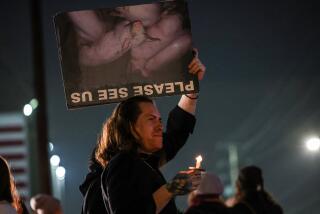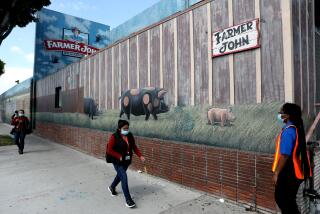Farmer City: Getting Lost in the Shuffle : The Illinois town is being left behind in the resurgence of rural America. And now, a photographer has captured its people’s profound discomfort.
CHICAGO — Rhondal McKinney toted his portable slide projector to the big city recently to report on the state of the small town--or at least on the state of one of them: Farmer City, Ill.
Farmer City, population 2,300, is not a boutique town. It is too far from any metropolis to attract yups who rehab Victorians and build mini-estates, bidding up land prices and gliding off each day for commutes to law firms and investment houses. Located in the distinctly unscenic flatland of central Illinois, it is not a haven for retirees nor a vacationers’ retreat.
It is not an industrial powerhouse, with a shipyard or a car factory. It doesn’t even have a prison.
In short, Farmer City is exactly the kind of place getting left behind in the rebound of rural America, a resurgence that has very little to do with agriculture. With a skyline dominated by a grain elevator, tying it symbolically and economically to outlying corn and soybean fields, Farmer City is instead what rural America used to be--and so, of course, it is fading.
McKinney, who chairs the documentary photography program at Illinois State University, has spent two years aiming his Hasselblad at Farmer City and is starting to exhibit the results. The Chicago Tribune called his efforts “blunt realities,” comparing his portraits to those of Diane Arbus and Weegee, who specialized in urban society’s fringe.
Through McKinney’s lens, Farmer City’s people display a profound discomfort. He uses a flash, even outdoors, flooding his subjects with a garish, harsh light that disconnects them from their surroundings. He knows from talking with them that their problems are the stuff of inner-city drama--single parenthood, welfare dependence, a lack of good jobs, an unsettled future.
He focused on a blank wall. The show began. Click. The grain elevator, once run by the West family, then sold to a conglomerate, which mechanized and cut jobs. Click. Ralph and Marsha Turpin, who represent the last generation making it in town. Ralph is 48 and drives to Champaign, 35 miles away, to work in a factory producing mayonnaise and vegetable oil. He lives in the house that he dreamed about owning when he delivered papers there as a kid. His wife is laid off.
Click. The Powell family, in their early 20s. Tanya is pregnant. Shane is long-haired and pushing a stroller containing the two girls, Alix and Hope. The effect is forlorn. They would soon move away.
Click. A stern, tired woman and a somber boy of about 10. “This is Joanne and her son, Mike,” McKinney said. “Real typical story. Grew up in Farmer City, went to the high school, left high school early, went to work at a factory for 17 years. Good salary. Had five weeks’ vacation. Benefits.
“Company relocated to Mexico in 1991. She had a severance package. Went to a nearby community college, studied to be a legal secretary. Can’t get a job. There are only a couple of lawyers in Farmer City.
“She carries a beeper for somebody, a crisis hotline that pays her a few dollars a day. She kept another kid overnight, whose parents work the night shift, and got him off to school. Got a few dollars for that.
“She takes in people’s laundry. She takes in office work, does typing. Last time I was there, she asked me to sign a petition for a political candidate. I thought, ‘If Joanne likes this candidate, he must be all right.’ Turned out she didn’t know the guy either, but she was getting paid $7 an hour to collect signatures.”
Like Joanne, Farmer City won’t go down without a fight. The high school remained open, merging twice with others that collapsed in nearby towns. The Memorial Day parade, street dances, kick-boxing and the Mid-Illinois Ballet all keep on. The county fair was scrubbed in 1995--the fairgrounds were coveted by a trucking firm, which since has decided to take its 60 jobs and leave. This year, the fair, at least, revived.
McKinney set up a tent there, inviting revelers to pose. Click. A radiant twosome, blond boy’s arm around waist of dark-haired girl. “This is a couple that in four or five years is going to be like the Powell family,” the photographer said.
More to Read
Sign up for Essential California
The most important California stories and recommendations in your inbox every morning.
You may occasionally receive promotional content from the Los Angeles Times.










